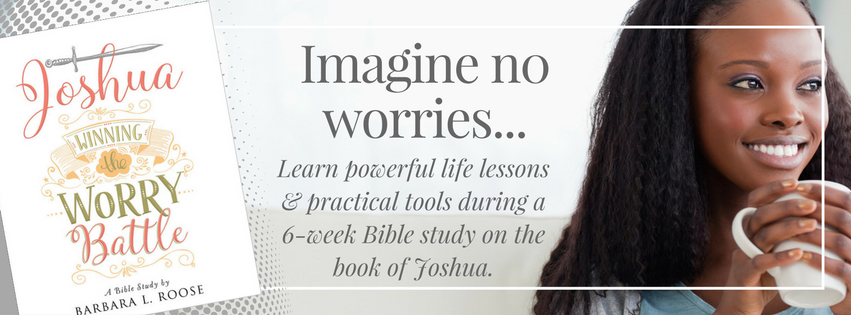by Barb Roose
One Sunday afternoon I received a Facebook message from someone asking for help.
This sweet lady, whom I’ll call Leah, lost her father recently. If you’ve lost a parent or any loved one, you know that the grief runs deep. Dealing with the grief requires time, rest, and lots of self-care. Yet, she was unable to care for herself because others had pushed the worries and cares in their lives from their life onto her.
Leah was overwhelmed, except the worries weren’t her own. She was drowning in the worries of loved ones around her. I’ve known Leah almost my entire life. She manages her personal affairs well and plans for the future. Yet, she felt ensnared because of her fear of uncertainty and worries about her adult children. One was experiencing a second, unplanned pregnancy and another had neglected taking care of some serious legal issues and was looking at jail time. Leah told me that she promised money, time, and energy to help her loved ones get through their situation. But she also admitted that this cycle of being stressed out and bailing out had been going on for years. In fact, before Leah’s father passed away, he gently warned Leah that taking on other people’s problems would destroy her. He was right.
I diagnosed Leah’s condition as “Secondhand Worry.”
You might be suffering from Secondhand Worry if someone tells you about his or her problems and then, you end up suffering physical and emotional worry symptoms. Another symptom of Secondhand Worry is when worry drives you to assume responsibility for someone else’s problem. (If you’re familiar with recovery principles, that kind of Secondhand Worry is worry-driven enabling.)
Here are some practical examples:
• Your spouse has trouble with a manager, and you begin to worry about his job loss.
• Your child struggles with a subject at school, you worry that he or she will end up living on your couch well into their adult years.
The problem with Secondhand Worry is that we experience all of the symptoms associated with worry like sleepless nights, stressed out feeling, lack of appetite or overeating, frayed nerves BUT the situation isn’t even about us.
If you can relate to Leah, it’s a difficult place to be. Life is hard enough trying to fight in faith for our own victory over worry. It’s not possible for us to fight someone else’s battle, too.
For the past few months, I’ve been studying Old Testament book of Joshua and there is a situation where Joshua ends up with a case of secondhand worry. God prohibited the Israelites from making treaties with the inhabitants of Canaan, yet Joshua and the leaders were snookered by a group of Gibeonites with a fictitious story and some deceptive visual aides (Joshua 9:9-13). Instead of consulting God for wisdom, Joshua and the leaders made a treaty with the lying Gibeonites, whose deception was driven by fear. As a result, the Israelites ended up being responsible for a group of people that God warned them against.
Are you feeling responsible for people in your life who should be responsible for themselves? Do they keep coming back to you over and over again with endless excuses and sad stories?
If you’ve been caught in Secondhand Worry, you know what it’s like to hemorrhage money or spend sleepless nights because someone in your life didn’t manage his or her business. I’ve said it before and I’ll say it again, don’t let someone else’s worry wear you out!
Years ago, my friend and licensed therapist Tim challenged me to admit that I was struggling with Secondhand Worry. In fact, we had a few heated sessions because I told him that he just didn’t understand! What if I didn’t intervene and something horrible happened? Then, Tim made this powerful statement: We have to let the people in our lives discover their own need for God.
Is there someone in your life that you love, but you realize that it’s time to step back and let them discover their need for God?
It’s not my role to advise you not to help, but realize that your helping has the potential to hurt both of you. It’s hurting them because instead of allowing their consequences to push them toward God, you might be putting yourself in the way. It’s hurting you because you’re carrying a heavy load of someone else’s mess. Perhaps the person will see God more clearly once you get out of the way…
I recognize that the answers to the questions of how to handle your situation might be complex. No doubt there will be emotions involved. That is why prayer is so important. When you pray, God’s wisdom can cut through your emotions and deliver clarity. Furthermore, in prayer, God’s Holy Spirit may reveal or remind you of something that wasn’t present during your conversation with that person.
If you determine that it would not be healthy to aid someone, saying “no” is difficult, but you’ve got to do it — both for their sake and yours! Here are a few things that you can say instead:
- I’m so sorry about your situation, but I am unable to help you at this time.
- That is so difficult! Can I help you put together a plan that you can use to deal with this situation? (Only if you can plan without taking responsibility!)
- I know that you can figure this out. Keep me posted on how you are doing.
It feels bad saying “no” to helping someone, but remember, you aren’t saying that they aren’t worthy of help, only that you are no longer getting in the way of God helping them.
SHARE A COMMENT BELOW: What’s the hardest part about stepping back and letting your loved ones and friends take care of their own problems?




